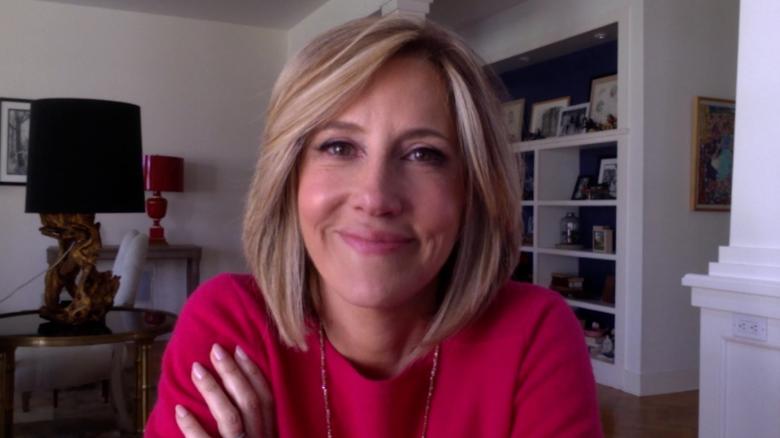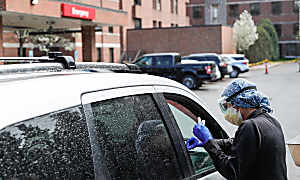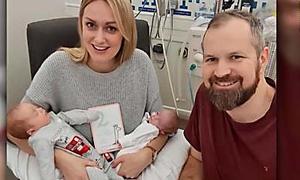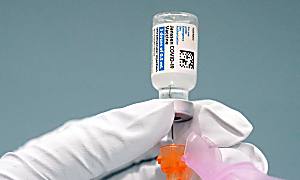- Get link
- X
- Other Apps
Infertility and my path to surrogacy
Essay by Nikaline McCarley, CNN
Updated 1452 GMT (2252 HKT) April 23, 2021
This is one in a series of stories about infertility for National Infertility Awareness Week.
(CNN)I'll never forget the look on my fertility doctor's face, her eyes saddening as she gently turned toward my husband and me, looking away from the ultrasound scan.
"I'm sorry," she said. "I don't hear the heartbeat today."
At that moment, I swear I could feel my actual soul fracture. How could this be happening? How was my world erupting into unimaginable tragedy once again? How, after everything I had been through, could I turn to God for answers and only hear, "Honey, this pregnancy just wasn't meant to be"?
The seven-and-a-half-week-old embryo I lost three years ago came from an extremely challenging IVF cycle, one that my fertility doctor told me was my last shot. I was 36 years old. As it turns out, yes, it was my last shot at carrying a baby -- but it wasn't my last shot at having a baby.
Two years earlier, I had given birth to a tiny and fierce baby daughter. Seven days before her first birthday, I was diagnosed with stage 0 breast cancer. I also learned that I was a carrier of a mutation in the BRCA1 gene. Some mutations in the BRCA1 and BRCA2 gene can impact a person's chances of developing certain types of breast and ovarian cancer. I had a double mastectomy and surgery to remove my fallopian tubes, immediately following my diagnosis. I chose the most aggressive form of treatment possible to decrease my risk of a second cancer recurrence.
My husband and I had talked all the time about how to have a second child throughout my medical treatments. Fertility specialists suggested that the best option was to try in vitro fertilization. With IVF, embryos can be tested for the BRCA gene mutation, and, if detected, a couple can then choose to select a BRCA mutation-free embryo for implantation. We both agreed we wanted to do everything possible to try and prevent the BRCA gene mutation from passing on to any additional children we might have.

Nikaline McCarley (far left) is shown with her family. The author suffered a pregnancy loss in IVF treatment three years ago. She and her husband then successfully used surrogacy to have a second child.
Through the IVF process, my fertility doctor noticed I had severe residual scar tissue in my uterus from my first pregnancy, which significantly reduced my chances of the IVF embryo implanting and surviving. In what seemed like a miracle, my implantation was successful. I reassured myself over and over again that I had paid the karmic gods in full and I was finally optimistic about the future.
There we were in the fertility clinic that April morning when it all came crashing down. That morning, we were full of promise and elation for this soon-to-be baby. Just five days earlier, we heard the heartbeat of this growing fetus, a feat that just a short time before seemed impossible.
A difficult journey
My physician suggested looking into gestational surrogacy as a possible option, but at first, the thought of another woman carrying my baby was beyond terrifying. I did not think I could trust another person with something so important, let alone a stranger, and the loss of not feeling my growing baby inside of me was almost impossible to digest.
My brain, on some level, could recognize what I was being told was useful information, but my heart couldn't comprehend any of it. I did not know how to process the grief over my sudden loss, the all-consuming pain I felt in every molecule of my body.
The next few days were filled with overwhelming agony as my body still believed I was pregnant, but my mind and heart knew what I had lost. I dove headfirst into surrogacy research and made it my life's mission to read every article regarding surrogacy, absorbing all surrogacy, all the time.
On the "Today," show, "The Tonight Show" host Jimmy Fallon's story about his own family's surrogacy experience resonated with me. "If there is anyone out there who is trying ... just hang in there. Try every avenue. ... You'll get there. You'll end up with a family, and it's so worth it. It's the most worth-it thing."
My husband and I joined a well-regarded gestational surrogacy agency. After a six-month wait, we finally got the call we had been praying for. We had been matched with a wonderful surrogate in another state in the Midwest, since gestational surrogacy was illegal in New York at that time. So, we transferred our embryos to a fertility clinic in New Jersey and waited while my surrogate and I endured endless medical appointments, psychological evaluations and background checks.
Every relationship between a surrogate and intended parent is different. Some have little communication while others talk every day. My surrogate and I would touch base almost nightly through text message, checking in about how she was feeling, if anything related to the pregnancy had come up throughout the day. I really enjoyed the open communication I had with my surrogate while also respecting her personal time and space.
Matching with a surrogate who will carry your child is not an easy task. Qualified agencies first extensively vet women who are interested in surrogacy, making sure several medical and personal qualifications are met before they can be matched with intended parents. My husband and I knew that our surrogate had been vetted thoroughly by our agency and multiple doctors. We enjoyed our initial conversation with her before we officially matched.
The gift a surrogate gives to a family is hard to put into words. I believe surrogates are walking angels on this Earth, helping struggling families in the most remarkable way imaginable.
After countless meetings, video sessions and phone calls, my surrogate and her husband flew into Newark for the implantation in March 2019, and we then buckled down for 10 agonizing days of waiting for the pregnancy results.
I remember sitting on the bathroom floor at home as the fertility clinic nurse phoned with the news.
"It's a positive pregnancy," she said. "We have a really strong start."
I cried like I never had before. In that moment, all the heartbreak that infertility had thrown my way was over. In that split second, it had all been worth it.
That said, gestational surrogacy is not easy. It's complicated, emotionally taxing and expensive -- starting at around $129,000 and up. It's complete loss of control over something so precious and a privilege for those who can afford it.

McCarley's son is now a healthy 16-month-old toddler.
It also has become somewhat more common, proving to be more than a passing trend for families in need.
"The number of transfers for ART cycles using gestational carriers almost tripled, from 1,957 in 2007 to 5,521 in 2016," according to a 2016 Assisted Reproductive Technology report. "The percentage of transfers using a gestational carrier among all transfers also increased, from less than 2% in 2007 to almost 4% in 2016."
Infertility and surrogacy tested my strength in ways I never thought possible, but it also opened my eyes to the true wonder and beauty of science, medical advancement and community.
Get CNN Health's weekly newsletter
Sign up here to get The Results Are In with Dr. Sanjay Gupta every Tuesday from the CNN Health team.
Three years later, through an amazing gestational surrogate, I have our son. He's the most adorable 16-month-old boy I could have ever imagined, and I know it was all supposed to work out this way.
He was the baby we were meant to have. On this unpaved and excruciatingly painful road that is infertility, hope is on the other side of hell, it's just around the bend, and the joy and love that awaits is, as Fallon said, "the most worth-it thing."
Writer Nikaline McCarley works as a freelance entertainment reporter for Us Weekly. She lives with her husband and two children in Westchester, New York.
- Get link
- X
- Other Apps
















